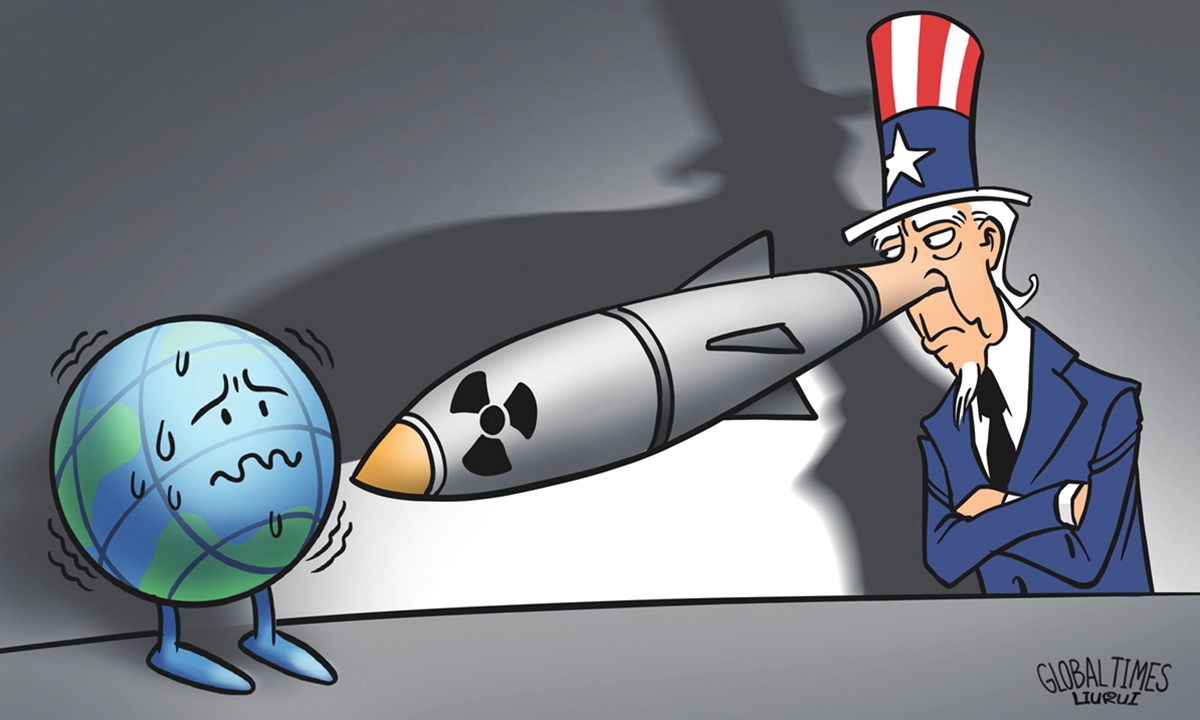
US nuclear power Illustration: Liu Rui/GT
With the 10th Review Conference of the Parties to the Treaty on the Non-Proliferation of Nuclear Weapons (NPT) being held at the United Nations headquarters in New York from August 1 to 26, the issue of nuclear non-proliferation has once again become the focus of global attention.
Washington today doesn't let go of any occasion that can be exploited to smear and contain China. A US representative on Thursday at the NPT Review Conference baselessly criticized China for accelerating the expansion of its nuclear arsenal. And the US side also accused China of not engaging in talks on new arms control framework. China has lashed out at the rhetoric.
"By making such groundless accusations, Washington wants to deflect blame, distract attention and shun US' due responsibility in securing global nuclear safety. Washington hopes this way can constrain the improvement of its main competitor's nuclear capabilities," Su Hao, founding director of the Center for Strategic and Peace Studies at the China Foreign Affairs University, told the Global Times.
China has always kept the quantity and size of its armed forces at the minimum level necessary for maintaining national security. China's nuclear strategy focuses on self-defense, and aims to ensure the strategic security of the country by deterring the potential threat or use of nuclear weapons by others against China. And China has never taken part and will never take part in any nuclear arms race. Washington's rhetoric is totally irrational.
In fact, the country that has blatantly violated the nuclear non-proliferation agreement is the US. Chinese Ambassador for Disarmament Affairs Li Song on Friday blasted the US for its negative moves on disarmament. He told a committee meeting of 10th NPT Review Conference that Driven by the Cold War mentality, the US has been obsessed with major-power strategic competition and has sought absolute strategic advantage, strengthened military alliances, stirred up bloc confrontation on the eastern and western sides of the Eurasia continent, and pressed ahead with the forward deployment of nuclear missiles and other strategic forces.
The landscape on international security is deteriorating and the risk of nuclear proliferation is growing. The responsibility lies with the US.
The US-led NATO's continuous eastern expansion triggered the military clash between Russia and Ukraine, with no sign of easing up to now. In the Asia-Pacific region, Washington has provoked China's national security in a high-profile manner for several times, in an attempt to contain China. US House Speaker Nancy Pelosi's visit to the island of Taiwan is the latest example, which has ramped up the cross-Straits tensions.
Meanwhile, the US, which has the largest and most advanced nuclear arsenal, plans to spend over $1 trillion to maintain and modernize its nuclear triad. Furthermore, Washington withdrew from the Anti-Ballistic Missile and the Intermediate-Range Nuclear Forces treaties successively. President Joe Biden stepped back from a campaign promise that the sole purpose of nuclear weapons should be to deter nuclear attacks. All these moves may result in nuclear proliferation globally.
According to Song Zhongping, a Chinese mainland military expert and TV commentator, the US has always adopted double standards on nuclear non-proliferation. As one of the first countries to call for a nuclear non-proliferation treaty, the US is constantly setting rules on the nuclear non-proliferation to deter other countries, especially its rivals, from developing nuclear capabilities. But ironically, the US itself does not abide by these treaties and rules at all. For example, under AUKUS, the US and the UK are anticipated to assist Australia to have nuclear-powered submarines, which has severely violated the principles of the NPT. The US should not always give the green light to itself and the red light to others on this issue, as such a practice will lead to nuclear proliferation and arms race.
The biggest crisis confronted by the nuclear non-proliferation mechanism is that because of US' double standards, distrust among countries has been rising. As a result, an increasing number of countries do not believe in the restraint mechanism brought by the NPT. It can be concluded that the root of the grave and urgent nuclear proliferation situation lies in the US.
The US-led global governance mechanism is disabled in nuclear non-proliferation. "This is because this mechanism is a unilateral, selfish, narrow-minded, bloc-political governance, to serve the US in maintaining its global hegemony. Such a global governance system will only lead the international community more tense and turbulent," noted Su.
"The nuclear non-proliferation advocated by the US is entirely out of its geopolitical consideration. Washington's hegemonic mindset increases the difficulty of achieving true nuclear non-proliferation. The US must take the lead in implementing the NPT; otherwise, nuclear non-proliferation cannot become a reality," said Song.
China has always advocated building a community with a shared future for mankind. Only if the international community, including the US, can consider the nuclear non-proliferation from this perspective will such a crucial international problem be addressed.

